10 Tips For Cooking Fish On The Grill, According To A Chef
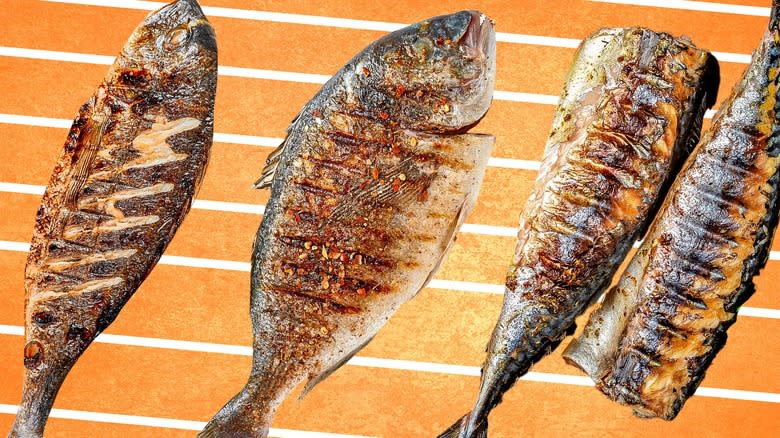
Anyone who loves to grill knows that cooking outdoors is always better. It's more enjoyable to cook out in the open air, which may be why the food always seems to taste better. But while grilling season is the best time of the year in many people's opinion, the sheer joy of cooking over an open flame can falter when you switch from meat or poultry to fish.
Fish is a whole new ballgame when it comes to grilling. It's much more delicate and easier to mess up. It can dry out, burn, or -- worst of all -- break apart while you're turning it and fall through the grates onto the flames.
Of course, you can avoid those unhappy outcomes with a bit of knowledge and a handful of useful tips and techniques. As a trained chef and former restaurateur in Atlantic Canada's seafood-centric market, I've grilled a lot of fish over the years, and know the best ways to make the most of this protein on the grill. Here's what you need to know to do it well.
Read more: 15 Different Ways To Cook Fish
Choose The Right Kind Of Fish For The Grill
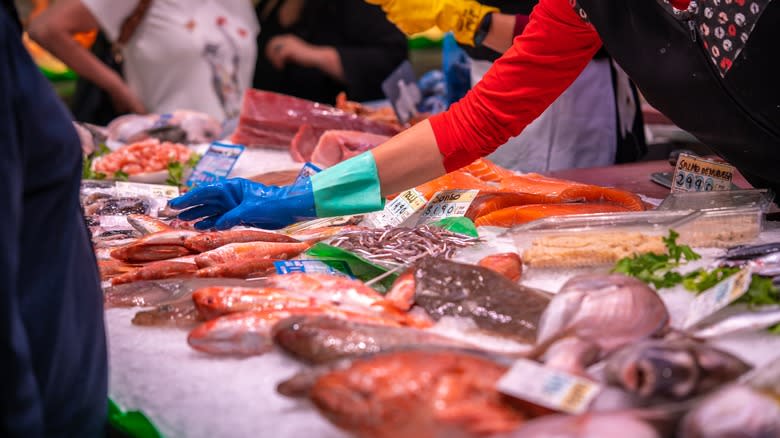
Whether it's beef, pork, poultry, or even patties or sausage links, meats almost always grill nicely. However, that's not necessarily the case with fish, which are often more delicate and don't hold together nearly as well when you grill them. The muscle fibers of fish are generally shorter than those in land animals, and the bonds that hold them together aren't as robust. Given this, be sure you select a fish variety with a firm, dense texture when grilling to prevent it from falling apart while flipping it.
Strong-swimming apex predators like tuna, swordfish, and sharks are leading examples, as these species have a texture reminiscent of red meat. Sturgeon is harder to find but also grills beautifully. Other more readily available and often less expensive options that are excellent for the grill include salmon, sable (aka black cod), Pacific cod, halibut, and monkfish. Most coastal areas tend to have a few local favorites, as well.
Conversely, you should avoid grilling fish with delicate flesh, like tilapia, haddock, or catfish, which will likely crumble apart over the open flames. When in doubt, ask your local fishmonger for guidance.
Grilling Fish Whole And Skin-On Gives You More Options
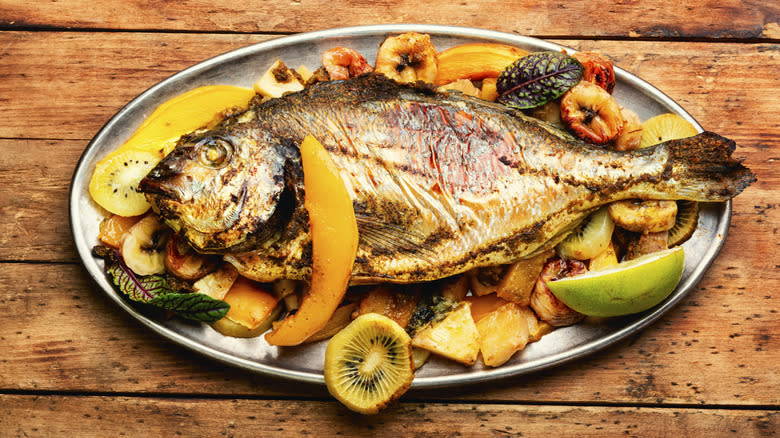
Although softer-fleshed fish don't hold up well when grilled, there are ways to work with them successfully. One of the better options is to grill whole fresh fish instead of only fillets. Many popular panfish aren't ideal for grilling in skinless fillet form-- but can work well when left whole. You can find select varieties of fish sold whole and skin-on at most supermarkets, or use fresh fish you've caught yourself.
There are several beneficial reasons to leave the skin when cooking fish on the grill. For starters, the skin and skeleton lend your fish a lot of structural strength (that's what they're designed for by nature, after all). Even after cooking, when the flesh is at its flakiest, they'll help keep your fish intact. The skin prevents the delicate flesh from drying out during cooking, as well, by providing a physical barrier against the searing heat. Additionally, there's usually a protective layer of fat under the skin, which renders out as it crisps and helps keep the fish moist.
Cooking fish whole offers culinary benefits beyond those practical considerations, though. A whole grilled fish looks beautiful at the table (totally Instagram-worthy), and you can stuff its cavity with fresh herbs or citrus for additional flavor. The crisp skin itself is a delight -- and often my favorite part. But even if you choose not to eat the skin, you'll still appreciate how it improves your grilled fish meal.
Clean Your Grill Diligently Before Cooking Fish
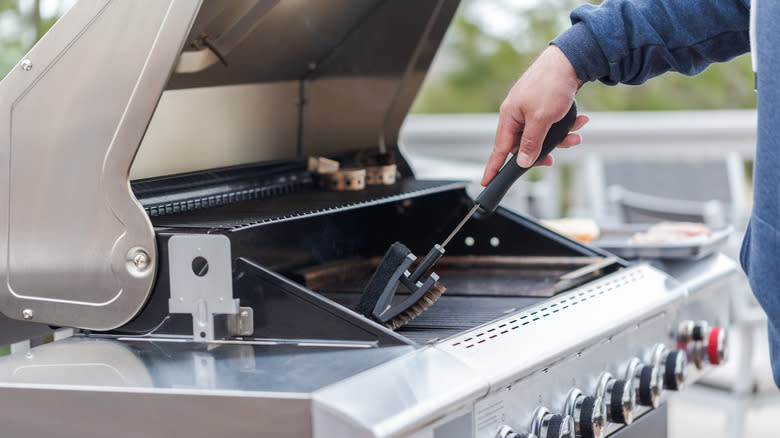
Picking the right fish to grill is an important preliminary consideration, but there's another that looms equally large. Successful grilling requires good technique and well-kept equipment, and cleaning your grill regularly qualifies as both. The logic here is simple: a dirty grill is a sticky grill. While steaks, burgers (usually), and other land-based proteins aren't apt to fall apart if they get stuck to the grates, fish generally will.
To avoid this pitfall when cooking fish on the grill, you'll want to preheat the appliance properly and be sure to oil the grates ahead of time. Thoroughly scrape and scrub the grill grates with your preferred cleaning tool before cooking. Then, preheat the grill and use a pair of long tongs and a cloth to rub a generous coating of oil on the grates.
Finally, brush or spray a thin coat of oil on the fish itself before you place it on the grill. If you follow these steps, your fish is much less likely to stick. Plus, who wants gritty black mystery bits stuck to their fish?
Reduce The Risk Of Fish Breaking Apart With A Grilling Basket
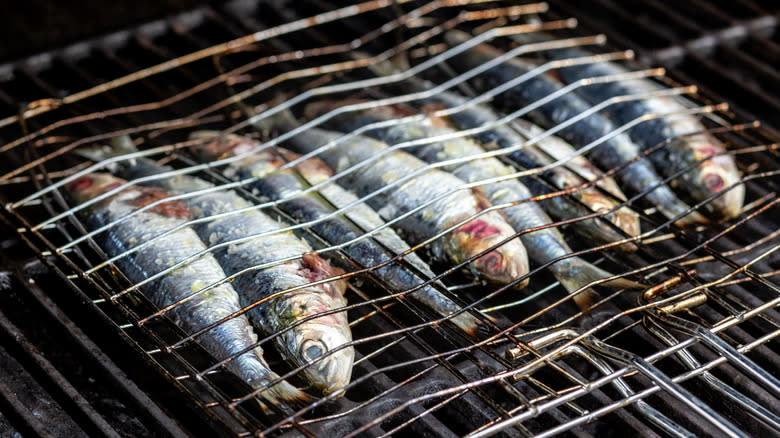
Sometimes, even highly skilled cooks will look for a tool that can stack the odds in their favor and ensure their dish is perfectly cooked. Since the most difficult part of grilling fish may be flipping it without breaking it, a quality grilling basket can improve the likelihood of doing so successfully -- particularly with truly delicate fish.
There are two kinds of grilling baskets: the open ones used mostly for grilling vegetables, and the two-sided version used primarily for fish. The latter has a hinge and opens up like a sandwich press. Your fish rests between the two metal sides, which are secured with a latch to keep the basket closed while cooking. The basket itself has a finer mesh than the grill grates. This helps keep fish intact -- partly by minimizing its contact with the actual grill, and partly by not physically allowing the muscles to move and separate from each other.
Treat the basket like a scaled-down version of the grill itself. Heat it beforehand -- because fish is more likely to stick to cold metal -- and then oil it before adding your fish.
Grill Fish On Top Of Citrus Slices To Avoid Sticking
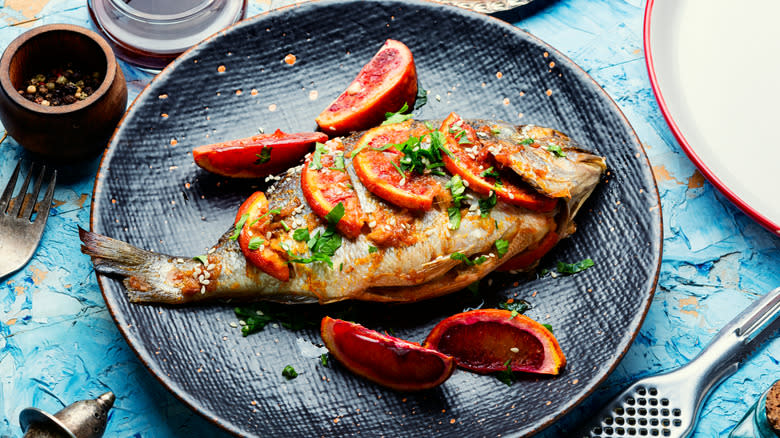
Grilled or charred citrus fruit is a great ingredient that can be used in numerous ways, including cocktails and vinaigrettes. So, here's a thought: why not cook your fish over citrus slices?
There's a lot to love about this idea. For one thing, citrus fruits like lemons and limes are a perfect pairing for fish, and they'll infuse flavor into your fillets as they cook. More importantly, fish sticking to the grates is a big issue when cooking it on the grill (as I mentioned earlier). But if you cook fish on top of citrus slices, the protein will never again stick to your grill because it'll never touch it directly.
Now, you'll still need to be careful when turning the fish to ensure the fillets don't break or crumble. But you can rest assured knowing that sticking won't be an issue. As a bonus, you'll also have nicely charred citrus slices to use as a garnish or as the basis for a sauce. It's a solid win on every level.
Wrap Your Grilled Fish In Bacon For A Tasty, Nonstick Coating
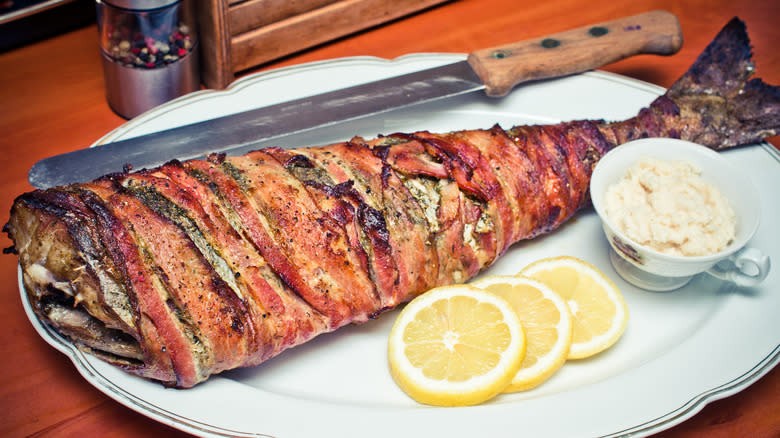
There's one trick for grilling fish that makes it less likely to stick, helps it stay intact, and makes it taste good, too. In fact, wrapping your fish in bacon is a delicious way to keep fish from sticking to the grill -- and gives you many similar benefits as grilling fish with the skin on. Bacon holds fish together, protects the delicate flesh from the grates, and prevents it from drying out. As a bonus, the salty pork product adds plenty of sweet, smoky flavor to your dish -- and who doesn't like bacon?
Now, you'll need to par-cook the bacon first. Otherwise, your fish will be overcooked by the time the meat is crisp. You don't want to overcook the bacon, either. It needs enough flex left so you can easily wrap the bacon strips around the fish and secure it with toothpicks or skewers (just don't forget to remove them before serving).
This method works best with small, whole fish or thick loin portions from a fillet. Monkfish may be best suited for this preparation method because of the cylindrical shape of its fillets. This makes them easy to wrap, while its lobster-like sweetness plays nicely with the savory bacon.
Add Flavor And Protect Fish On The Grill With Banana Leaves
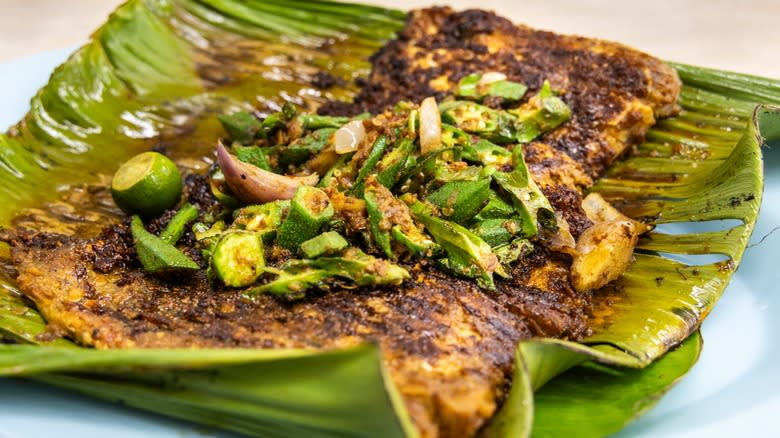
Grilling your fish over a flame instead of pan-frying or baking it adds a pleasant smokiness. While you might want to double down on that flavor by adding hickory or applewood chips, this assertive flavor can easily overwhelm fish. However, banana leaves can be used as a replacement for that smokiness.
Banana leaves are commonly used for cooking in many cultures. After all, wrapping roasted meats in banana leaves leads to unbelievably juicy results -- and grilling fish in this manner is no different. Banana leaves act as a protective layer between the food and the heat and impart a delicate smoky flavor. You can think of them as a more exotic version of grilling your fish on a cedar plank.
Banana leaves can often be found in Latin or Asian markets. If you can't find them, you can also wrap your fish in soaked corn husks or use fig leaves instead. The flavors will be slightly different, but the general effect is essentially the same.
Grill Fish In Foil Pouches To Keep Them Intact
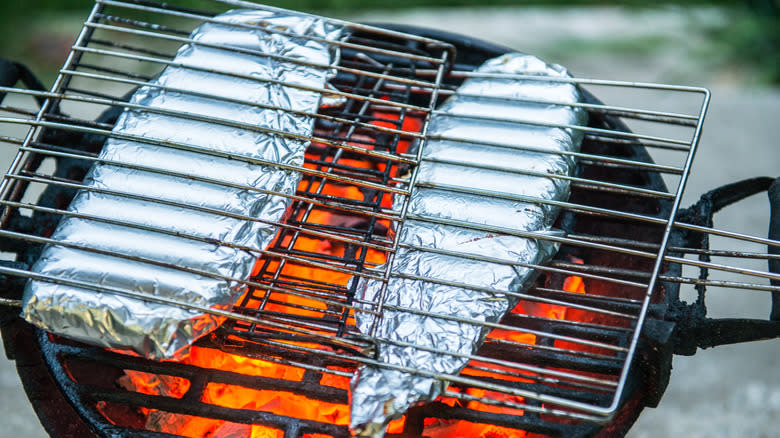
One alternative method of grilling fish requires no special preparation. Plus, it means you'll never watch in dismay as a fillet breaks and falls through the grate. Rather than wrapping it in bacon or exotic leaves, make a foil packet when cooking fish on the grill.
There's a lot to like about this method. It's essentially the same technique as cooking fish en papillote (or in a parchment paper pouch), but you swap the parchment for foil. Your fish will steam in its juices and absorb flavor from any herbs or spices you choose to add. You can even slash the top to let some steam escape, in which case you can still have crisp skin. Though you're likely to lose some of the smokiness that comes with conventional grilling with this method, it's still a great option for fish that would be too fragile for the open flames.
Use heavy-duty foil when grilling, or double up on a lighter-duty variety to be sure it doesn't burn through. It's also important to oil or spray the foil lightly to keep the fish from sticking inside. Some brands make special non-stick foil for cooking, and if you use that, you shouldn't need any additional oil.
Impart Additional Flavor To Grilled Fish With Marinades Or Rubs
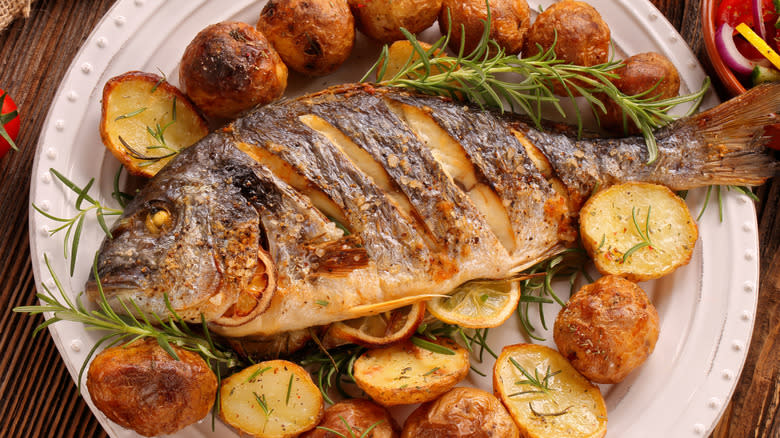
With a few bold exceptions (like mackerel or salmon), most fish have relatively light and delicate flavors. Now, you can easily overwhelm them if you season with too heavy a hand. But that doesn't mean you can't -- or shouldn't -- dial up the flavor with a well-chosen rub or marinade.
With whole fish, try filling the cavity with herbs, fruit, or savory stuffing. A dry spice rub both inside and out is another option that permeates the skin and flesh with flavor. Flavorful marinades work equally well with whole fish, as well as skinless or skin-on fillets. Many marinades call for an oil base, an acidic ingredient (such as vinegar or fruit juice), and herbs, spices, or aromatics to infuse flavors into the sauce.
Either technique offers some benefits. Both add a lot of flavor to your grilled fish, and an oil-based marinade can help crisp the skin. In the case of a skinless fillet, the marinade provides some of the same protection you'd otherwise get from the skin (preventing the fish from drying out). I recommend slashing the skin on your fish to allow more of the flavor to penetrate. This not only helps ensure even cooking but gives the finished meal a bolder look on the plate.
Don't Overcook Your Fish On The Grill
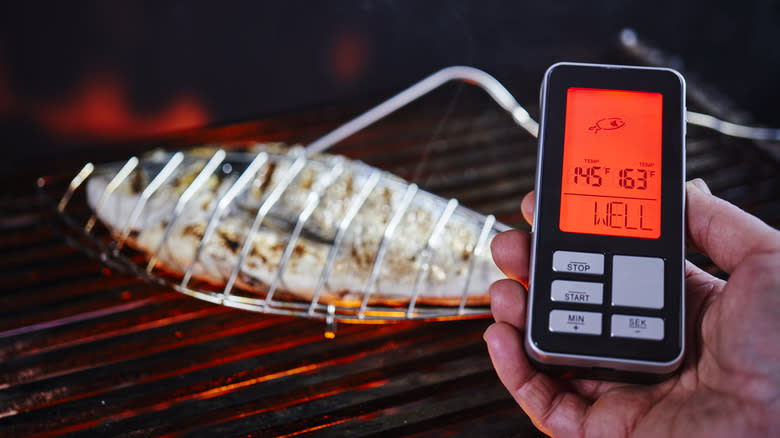
I have just three rules for cooking fish: Don't overthink it, don't overseason it, and, most importantly, don't overcook it. The first two are about keeping things simple, which is always a good rule -- especially when working with delicately flavored foods. The third one warrants a little more explanation.
Simply put, fish are not well suited for long cooking times. They generally don't have as much fat in the muscles as land animals do -- oily fish like salmon or mackerel notwithstanding -- and have little connective tissue to break down. Your best bet is to cook fish quickly at a relatively high temperature, which is why grilling works so well. You'll get a nicely browned exterior and maybe some pleasant charring, but it's quick enough not to overcook the middle.
Additionally, as with a steak, the best way to check if fish is done is with an instant-read thermometer. Unfortunately, many fish are just too thin for that to be practical. With fillet portions, sometimes you can just eyeball it: Fish becomes opaque as it cooks, and you'll likely see a visible line of "cooked-ness" rising toward the middle of the fillet. Moreover, the universal rule of thumb when cooking fish is to allot 10 minutes of cooking time for each inch. If you don't trust your eye with visible signs of doneness, following the 10-minute rule will usually keep you from overcooking your fish on the grill.
Read the original article on Tasting Table

